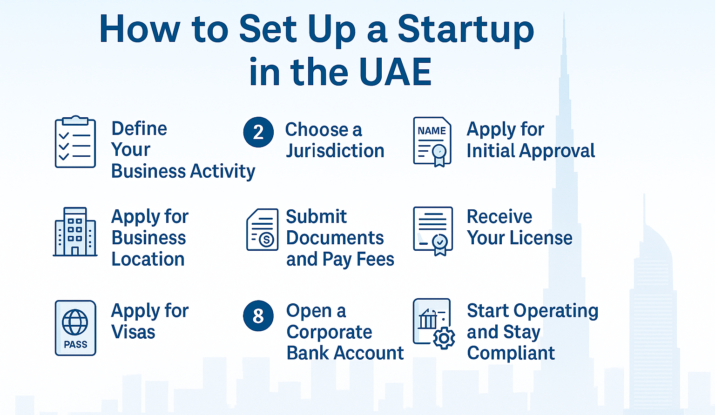The United Arab Emirates has rapidly emerged as one of the most attractive destinations in the world for startups. With a tax-friendly environment, a booming digital economy, and global connectivity, the UAE—especially cities like Dubai and Abu Dhabi—offers a unique launchpad for entrepreneurs looking to build and scale businesses in the Middle East and beyond.
Whether you’re a local innovator or an international entrepreneur, here’s a step-by-step guide to help you set up your startup in the UAE.
✅ 1. Define Your Business Activity
Before registering your startup, decide on the type of business activity you want to engage in. This will determine the kind of license you’ll need (Commercial, Professional, Industrial, or Freelance), and it must align with the list approved by the relevant licensing authority.
✅ 2. Choose a Jurisdiction
The UAE offers three main business jurisdictions, and choosing the right one is crucial:
-
Mainland – Operates under the UAE government and allows full freedom to trade within the UAE market.
-
Free Zone – Offers 100% foreign ownership, tax benefits, and simplified procedures. Best for tech, e-commerce, and service startups.
-
Offshore – Ideal for international business and asset protection; not allowed to operate directly within the UAE.
✅ 3. Reserve a Company Name
Your startup name must be:
-
Unique and relevant to your business
-
Free from religious or political references
-
Not already registered
You can check and reserve your name through the Department of Economy and Tourism (DET) or your chosen free zone.
✅ 4. Apply for Initial Approval
You’ll need to get initial approval from the authority (such as DED in Dubai or relevant Free Zone Authority) before moving ahead. This approval indicates that the government has no objection to your business setup.
✅ 5. Choose a Business Location
Every startup needs a physical or virtual office. Options include:
-
Flexi desks or coworking spaces (popular in Free Zones)
-
Dedicated office spaces
-
Virtual office packages for small startups or freelancers
A valid tenancy contract is also required (and must be registered through Ejari in Dubai).
✅ 6. Submit Documents and Pay Fees
Depending on your jurisdiction, you’ll be required to submit:
-
Passport copies of all shareholders
-
Emirates ID (if applicable)
-
Business plan (some free zones require this)
-
Initial approval certificate
-
Lease agreement / Ejari certificate
Fees will vary depending on:
-
Jurisdiction
-
License type
-
Office space
-
Number of visas
✅ 7. Receive Your License
After approvals and payments, your trade license will be issued. This document legally allows you to operate your startup in the UAE.
✅ 8. Open a Corporate Bank Account
Once your startup is registered, you can open a business bank account in the UAE. You’ll need:
-
Your trade license
-
Shareholder documents
-
Company stamp
-
Initial capital (requirements vary by bank)
Banks like Emirates NBD, Mashreq, and RAKBANK are commonly used by startups.
✅ 9. Apply for Visas
You can apply for residence visas for yourself, your partners, employees, or family members. Visa quotas depend on your office size and license type.
✅ 10. Start Operating and Stay Compliant
After setting up, ensure ongoing compliance:
-
Renew trade license yearly
-
Maintain accounting records
-
Register for VAT (if applicable)
-
Renew Ejari and visas on time
🚀 Why UAE is Ideal for Startups in 2025
-
100% foreign ownership in most sectors
-
No personal or corporate income tax
-
Access to funding, accelerators, and startup hubs
-
Strategic location connecting East and West
-
World-class infrastructure and digital services
🤝 Need Help Setting Up Your Startup?
At Buqadoo, we simplify the startup setup process in the UAE—handling everything from paperwork to licensing, visa support, and business consulting.
📍 Visit Us: Emirates Islamic Bank Building M04, Near Al Tiwar Center, Al Qusais 1, Dubai, UAE
📞 Call Us: +971 50 489 4381 | +971 56 138 2829
📧 Email Us: Info@buqadoo.ae
Let us handle the setup, so you can focus on your vision. 🌟

